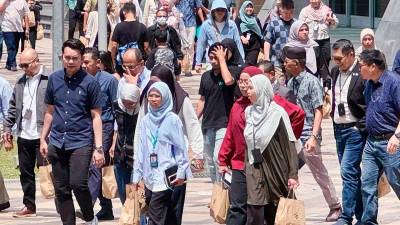PETALING JAYA: Malaysia’s middle-income squeeze is driven not only by rising costs but also by corruption and inefficiency that bleed the economy of growth potential, said Emir Research founder Dr Rais Hussin.
He said the challenges faced by Malaysia’s middle class – from wage stagnation and rising debt to falling savings – are symptoms of a political economy that has failed to generate high-value jobs and fair returns on public investment.
“The middle-income squeeze shows up in household budgets as rising debt, falling savings and higher living costs.
“But its roots run deeper – a political economy that bleeds efficiency through corruption and an industrial base that does not produce enough high-value employment.”
Rais said billions that could otherwise raise wages, expand social protection or improve infrastructure are lost through leakages, rent-seeking and opaque procurement processes.
“When subsidies are rationalised, the fiscal room created often gets blunted by inefficiency in delivery instead of maximising benefit to households.”
He added that Malaysia’s lack of industrial complexity keeps wages stagnant and productivity low.
“Much of our manufacturing remains in low to mid-skill assembly and resource processing. Services, too, are heavily concentrated in low-productivity retail and informal sectors.
“Without moving into higher-complexity industries – such as advanced electronics, green technologies, biotech, artificial intelligence, quantum and creative sectors – productivity stalls, wages stagnate and the economy cannot generate the surpluses needed to sustain a robust middle class.”
Rais said corruption and inefficiency also undermine fiscal credibility, even as revenue collection improves through the expanded SST and e-invoicing.
“At the end of the day, the resources lost to corruption are precisely the funds needed to invest in R&D, education and infrastructure that would allow Malaysia to climb the value chain and escape the middle-income trap.”
He stressed that the middle-income squeeze is not just a statistical issue but a reflection of declining financial resilience – shown in indicators such as high household debt, weak savings, housing unaffordability and reliance on dual incomes.
“Taken together, these indicators show that the squeeze is not merely about numbers; it’s about the erosion of financial security, asset access and upward mobility.”
Rais urged policymakers to link fiscal discipline with visible integrity reforms such as transparent procurement, performance-based development spending and clear communication on how subsidy savings are being channelled back to citizens.
“Malaysia must rebuild public trust through stronger anti-corruption enforcement and institutional accountability to ensure that savings and reforms genuinely serve the people.”
